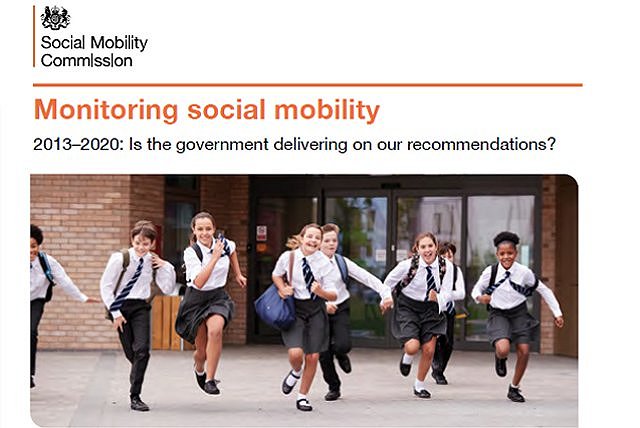Failure to act on Social Mobility Commission recommendations

The Social Mobility Commission has today (Wednesday 10 June) called for a new joined-up approach to promoting social mobility after government departments failed to act on a third of its key recommendations in the last 7 years. With the coronavirus (COVID-19) outbreak already having a devastating impact on the poorest groups it was imperative to tackle social inequality more effectively, it argued.
The commission’s new report - Monitoring Social Mobility 2013 to 2020: Is the government delivering on our recommendations? based on a comprehensive audit of government action on social mobility, reveals a disappointing level of progress.
The 52 proposals, made by the commission between 2013 and 2020, covered a range of policy areas including:
- early years
- education
- employment
- housing
- health
- transport
On a third of recommendations (31%) there was no or very little action, resulting in a red rag rating. On almost half (46%) there was some but insufficient progress – an amber rag rating. Only on a quarter (23%) had strong progress been made or the proposal delivered – a green rag rating.
The responses also exposed the lack of joined-up thinking and activity across Whitehall which is impeding progress on social mobility.
The commission concluded that a dedicated unit should be set up at the heart of government to coordinate action and ensure its recommendations were delivered.
Dame Martina Milburn, outgoing Chair of the Commission, said:
"The Prime Minister’s goal of ‘levelling-up’ opportunity would now have to take place in the context of the major economic and social dislocation caused by coronavirus (COVID-19). Social mobility has never been more important. It is the poor and the young who will suffer the most from the economic downturn. To succeed action will need to be driven from the heart of government. At present, there is no meaningful coordination between departments on the social mobility agenda, and no single force championing social mobility across government."
The report shows that prior to the coronavirus (COVID-19) outbreak, there was some evidence of progress in increasing life chances for poorer groups. More disadvantaged pupils were staying in education for longer and more poorer students were going into higher education and employment.
Good progress had also been made on supporting parents from disadvantaged backgrounds with help for home learning, and in eradicating illiteracy and innumeracy in primary schools. The government had also published proposals to reduce health inequalities in its NHS long term plan and made progress on mental health support for young people.
But the commission also identified several areas of ‘major concern’ where the government had failed to deliver.
Key areas where more progress is needed
Poverty
600,000 more children are now living in relative poverty than in 2012 but this is projected to increase further due to benefit changes and coronavirus (COVID-19).
Children from black and minority ethnic groups are more likely to be in poverty: 45% compared with 26% of children in white British families. The government should be more proactive in addressing poverty overall.
Early years
45% of the early years’ workforce are on tax credits or benefits. Steps need to be taken to increase the status and prestige of these workers. The government has declined to expand eligibility for the 30-hour childcare offer.
Schools
At aged 16, only 24.7% of disadvantaged students get a good pass in English and maths GSCE, compared with 49.9% of all other pupils. The attainment gap persists and will continue to do so unless there is a joined-up approach.
Post 16 education
There has been no move to give extra help to disadvantaged pupils aged 16 to 19 through a student premium. The government does not do enough to prioritise disadvantaged young people in this age group.
Employment
Half of all adults from the poorest backgrounds receive no training at all after leaving school. The government has not done enough to reverse declining participation in adult education and training.
Health
Life expectancy is falling for women in the most deprived 10% of areas. Issues around health inequalities and race linked to socio-economic background have also been exposed by coronavirus (COVID-19) and need to be addressed.
Place and regions
Devolution to regions and metro mayors has failed to adequately tackle regional imbalances or improve social mobility outcomes. There is no evidence of cross-government working on social mobility.
Sandra Wallace, joint deputy chair of the commission, said:
"It is disappointing that successive governments have only managed to make strong progress in one in four of our recommendations on social mobility. There needs to be a better way to ensure our advice is listened to and acted upon."
8 point plan for the government to achieve greater social mobility in the UK
Given the damaging economic impact of coronavirus (COVID-19), the commission said it was vital to design a ‘recovery plan to meet the needs of the most vulnerable’ and set out an 8 point plan for the government to achieve greater social mobility in the UK.
- A common cross-government strategy to tackle inequality and promote social mobility, driven by a single unit at the centre of government.
- Socio-economic background to be considered in all public policy.
- A welfare system that ensures children are not living in impoverished households.
- A better social mix in schools as diversity helps the academic achievement of less advantaged groups in particular.
- An early years strategy to help the helpers. Childminders must be given a decent wage.
- Further education to be better resourced and targeted with attention given to those aged 16 to 19 from disadvantaged backgrounds.
- Improve apprenticeships and adult education so more learners from disadvantaged backgrounds get the training they deserve.
- Give the regions more powers and funding, so they can target areas of disadvantage and social mobility cold spots.
Steven Cooper, joint deputy chair of the commission said:
"Coronavirus (COVID-19) is already having a huge impact on those from all disadvantaged backgrounds and this will only get worse as the recession bites harder. It is now really important to have a coherent and coordinated plan to help the most vulnerable in the months ahead."
Click here to download a copy of The Social Mobility Commission Monitoring Social Mobility 2013 to 2020: Is the government delivering on our recommendations? report
About The Social Mobility Commission
The Social Mobility Commission is an independent advisory non-departmental public body established under the Life Chances Act 2010 as modified by the Welfare Reform and Work Act 2016. It has a duty to assess progress in improving social mobility in the UK and to promote social mobility in England.
The Commission board comprises:
Dame Martina Milburn – outgoing Chair
Sandra Wallace, Joint Managing Director UK & Europe, DLA Piper – deputy chair
Steven Cooper, Chief Executive Officer, C. Hoare & Co – deputy chair
Alastair da Costa, Chair of Capital City College Group
Farrah Storr, Editor-in-chief of Elle
Harvey Matthewson, Aviation Activity Officer at Aerobility
Jessica Oghenegweke, Presenter, BBC Earth Kids
Jody Walker, Senior Vice President at TJX Europe (TK Maxx and Home Sense in the UK)
Liz Williams, CEO @FutureDotNow.UK
Pippa Dunn, Founder of Broody, helping entrepreneurs and start ups
Saeed Atcha, Founder and Chief Executive Officer of Youth Leads UK
Sam Friedman, Associate Professor in Sociology at London School of Economics
Sammy Wright, Vice Principal of Southmoor Academy, Sunderland
Sandra Wallace, Joint Managing Director UK & Europe, DLA Piper
Steven Cooper, Chief Executive Officer, C. Hoare & Co




